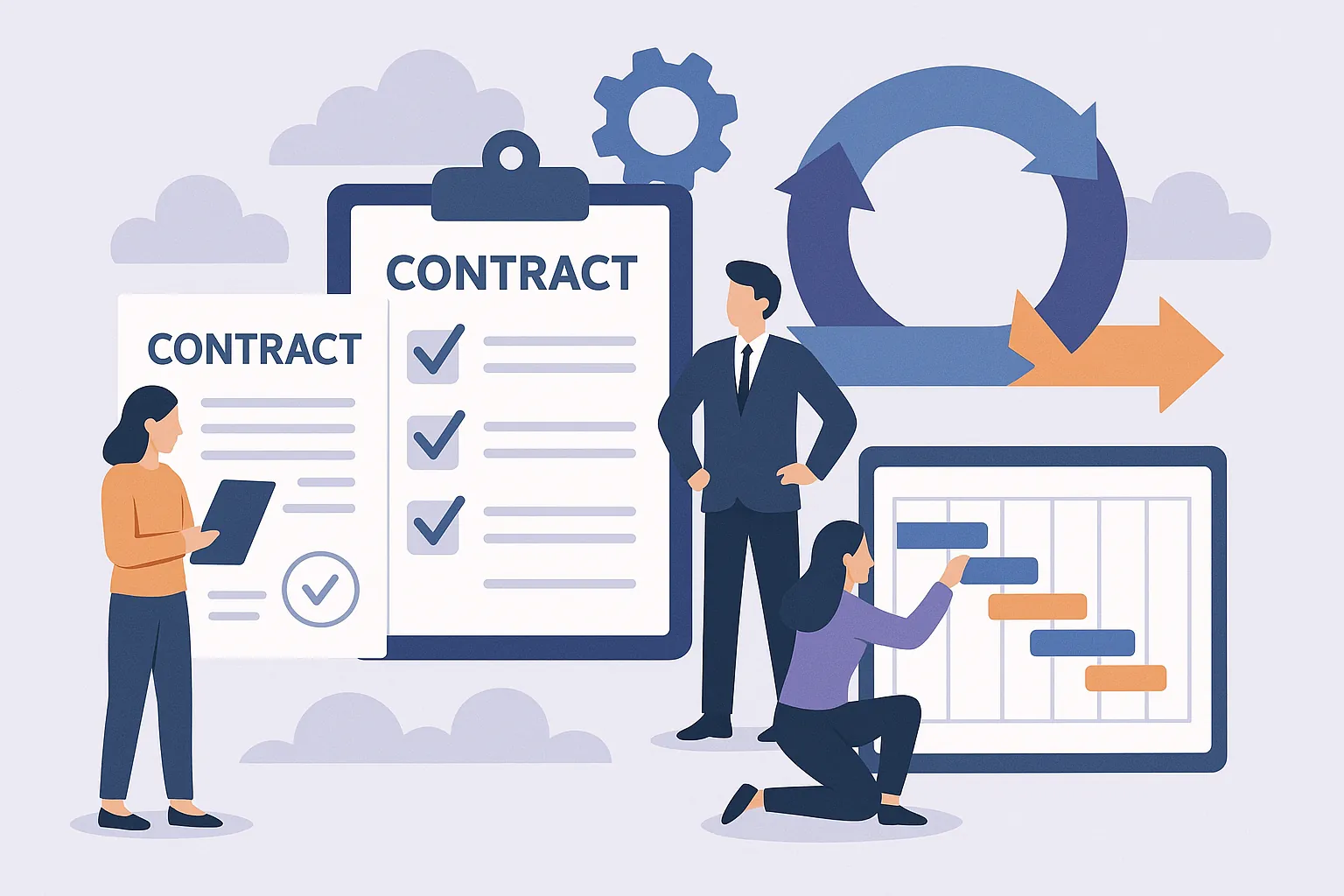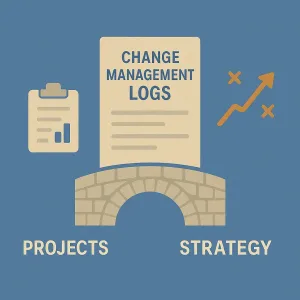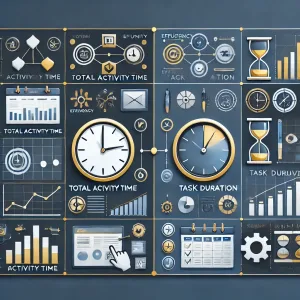Introduction
The effective handling of contracts is crucial for ensuring project success and maintaining positive relationships among stakeholders. Two key processes in this domain are contract administration and contract management, each playing a distinct yet complementary role in the lifecycle of a project.
Contract administration refers to the operational aspect of managing contracts post-signature. It involves overseeing the execution of contract terms, ensuring compliance, and maintaining accurate records throughout the project. This process is essential for addressing any issues that may arise during the project, such as changes in scope or unforeseen expenses, thereby safeguarding the interests of all parties involved [1][11].
On the other hand, contract management encompasses a broader strategic approach that begins even before a contract is signed. It includes the drafting, negotiation, and finalization of contracts, as well as ongoing monitoring and evaluation of performance throughout the contract lifecycle. This function is vital for aligning contractual obligations with project goals and ensuring that all parties adhere to their commitments [2][10][14].
The relevance of both contract administration and contract management in project management cannot be overstated. They are integral to minimizing risks, enhancing supplier relationships, and ensuring that projects are delivered on time and within budget. By understanding the differences and interconnections between these two processes, project management professionals can better navigate the complexities of contract-related challenges [12][13].
The objective of this blog post is to explore how to synchronize contract management with project management frameworks. By integrating these two critical functions, project managers can enhance their methodologies, leading to improved project outcomes and more effective stakeholder engagement. This exploration will provide insights into best practices for aligning contract management strategies with established project management principles, ultimately fostering a more cohesive and efficient project execution environment.
Understanding Contract Administration vs Contract Management
Understanding the distinctions and interconnections between contract administration and contract management is crucial for ensuring project success. Both functions play vital roles in the lifecycle of a project, yet they focus on different aspects of contract handling.
Defining Contract Administration
Contract administration is primarily concerned with the compliance, execution, and enforcement of contracts. This function involves the management of contracts once they are signed, ensuring that all parties adhere to the agreed-upon terms and conditions. Key responsibilities include:
- Monitoring compliance: Ensuring that all contractual obligations are met by both parties.
- Enforcement of terms: Addressing any breaches or disputes that arise during the contract’s execution.
- Documentation: Keeping accurate records of all communications and modifications related to the contract.
This phase is critical for maintaining the integrity of the contract and ensuring that the project progresses smoothly without legal or operational hiccups [4][5][10].
Defining Contract Management
In contrast, contract management encompasses a broader scope that includes the entire lifecycle of a contract, from initial planning and negotiation to performance evaluation and renewal. Key aspects of contract management include:
- Planning and negotiation: Developing the contract terms and negotiating with stakeholders to reach a mutually beneficial agreement.
- Performance evaluation: Assessing how well the contract is being executed and whether the deliverables meet the project’s objectives.
- Strategic alignment: Ensuring that the contract aligns with the overall goals of the project and the organization [1][10][12].
Contract management is essential for maximizing the value derived from contracts and ensuring that they contribute positively to project outcomes.
Overlapping Functions and Contribution to Project Success
While contract administration and contract management have distinct focuses, they also overlap significantly and contribute to the overall success of a project. For instance:
- Collaboration: Effective contract management lays the groundwork for successful contract administration. A well-negotiated contract with clear terms facilitates smoother execution and compliance monitoring.
- Risk Mitigation: By integrating both functions, project managers can better identify potential risks and address them proactively, reducing the likelihood of disputes and project delays [12][13].
- Enhanced Communication: Both functions require clear communication among stakeholders, which is vital for maintaining relationships and ensuring that everyone is aligned with the project goals.
The Role of Contract Management in Project Management
The integration of contract management is essential for ensuring that projects are executed smoothly and successfully. Contracts serve as the backbone of project agreements, defining the scope, deliverables, and expectations of all stakeholders involved. Understanding the distinction between contract administration and contract management is crucial for project managers to effectively synchronize these processes within their methodologies.
Importance of Contracts in Defining Project Scope and Deliverables
Contracts play a pivotal role in establishing the framework for a project. They outline the specific scope of work, deliverables, timelines, and responsibilities of each party involved. This clarity is vital for:
- Setting Clear Expectations: Contracts help in aligning the expectations of stakeholders, ensuring that everyone is on the same page regarding what is to be delivered and when. This alignment minimizes misunderstandings and disputes during the project lifecycle [1][10].
- Defining Roles and Responsibilities: By clearly delineating the roles of each party, contracts facilitate accountability and streamline communication, which is essential for effective project execution [12].
Risk Management Aspects Related to Contracts
Effective contract management is integral to risk management in projects. It involves:
- Identifying Potential Risks: Contracts can highlight areas of potential risk, such as compliance issues or financial liabilities, allowing project managers to proactively address these concerns [2][11].
- Mitigating Risks through Compliance: By ensuring that all parties adhere to the terms of the contract, project managers can mitigate risks associated with non-compliance, which can lead to delays and additional costs [3][12].
Better Project Outcomes through Effective Contract Management
The impact of effective contract management on project outcomes cannot be overstated. Key benefits include:
- Enhanced Collaboration: Properly managed contracts foster collaboration among stakeholders, leading to improved communication and teamwork. This collaboration is essential for navigating challenges that may arise during the project [4][10].
- Performance Monitoring and Evaluation: Contract management encompasses ongoing monitoring of performance against the agreed terms, which allows for timely adjustments and interventions. This proactive approach can significantly enhance project success rates [10][12].
- Streamlined Processes: Integrating contract management into project management methodologies can lead to more efficient workflows, reducing the time and resources spent on resolving disputes or renegotiating terms [5][14].
Project Management Methodologies and Their Approach to Contracts
The integration of contract management is crucial for ensuring that projects are executed smoothly and that all parties adhere to their obligations. Understanding how various project management methodologies incorporate contract management can help professionals synchronize these processes effectively. Below is an overview of popular project management methodologies and their approaches to contract management and administration.
Overview of Popular PM Methodologies
- Agile:
- Agile methodologies, such as Scrum and Kanban, emphasize flexibility and iterative progress. Contracts in Agile projects are often less formal and more collaborative, focusing on ongoing communication and adjustments based on project needs.
- Approach to Contract Management: Agile teams may use lightweight contracts that allow for changes as the project evolves. This approach fosters a partnership mentality, but it can lead to challenges in ensuring compliance with contractual obligations due to the fluid nature of Agile projects.
- Waterfall:
- The Waterfall methodology is a linear and sequential approach where each phase must be completed before the next begins. This method is often used in projects with well-defined requirements.
- Approach to Contract Management: In Waterfall projects, contracts are typically detailed and comprehensive, outlining specific deliverables, timelines, and payment schedules. However, the rigidity of this approach can create challenges when changes are necessary, as renegotiating contracts can be cumbersome.
- PRINCE2:
- PRINCE2 (Projects IN Controlled Environments) is a structured project management method that emphasizes organization and control throughout the project lifecycle.
- Approach to Contract Management: PRINCE2 incorporates contract management as part of its governance framework, ensuring that contracts are aligned with project objectives. It emphasizes the importance of managing supplier relationships and compliance with contractual terms, which can enhance project success.
Gaps or Challenges in Current Methodologies Regarding Contract Processes
- Integration Issues: Many project management methodologies do not fully integrate contract management processes, leading to potential misalignment between project goals and contractual obligations. For instance, Agile’s flexible nature may conflict with the rigid requirements of traditional contracts, creating confusion and disputes [12].
- Lack of Standardization: The absence of standardized contract management practices across different methodologies can result in inconsistencies in how contracts are managed and enforced. This variability can lead to misunderstandings and disputes among stakeholders [12].
- Communication Barriers: Effective contract management requires clear communication among all parties involved. However, methodologies like Agile, which prioritize rapid iterations and feedback, may struggle to maintain consistent communication regarding contractual obligations, potentially leading to compliance issues [12].
- Risk Management: Current methodologies may not adequately address the risks associated with contract management. For example, while PRINCE2 emphasizes governance, it may not provide sufficient tools for managing contractual risks throughout the project lifecycle [12].
Best Practices for Integrating Contract Management into Project Management
Integrating contract management into project management methodologies is essential for ensuring that projects are executed smoothly and efficiently. Here are some actionable strategies to synchronize these two critical areas:
- Establish Clear Roles and Responsibilities: It is vital to define specific roles for contract management within project teams. This includes identifying who will oversee contract creation, approval, and compliance monitoring. By assigning clear responsibilities, teams can ensure accountability and streamline the contract management process, which is crucial for project success [3][12].
- Implement Standardized Contract Templates and Checklists: Utilizing standardized templates for contracts can significantly reduce the time spent on contract creation and ensure consistency across projects. Checklists can also help project teams ensure that all necessary elements are included in contracts, reducing the risk of oversight and enhancing compliance with organizational standards [4][15].
- Encourage Regular Communication: Fostering open lines of communication between project managers and contract administrators is essential. Regular meetings and updates can help both parties stay aligned on contract terms, project timelines, and any potential issues that may arise. This collaboration can lead to more effective contract execution and management, ultimately benefiting the project [9][10].
- Utilize Project Management Software with Contract Management Features: Leveraging technology can enhance the integration of contract management into project management. Selecting project management software that includes contract management functionalities allows for better tracking of contract milestones, automated reminders for key dates, and centralized document storage. This integration can streamline workflows and improve overall project efficiency [2][5].
By implementing these best practices, project management professionals and consultants can effectively integrate contract management into their methodologies, leading to improved project outcomes and reduced risks associated with contract disputes and compliance issues.
Tools and Technologies for Contract Management Integration
Integrating contract management into project management methodologies is essential for ensuring that contractual obligations are met while maintaining project efficiency. The right tools and technologies can facilitate this integration, allowing project management professionals and consultants to synchronize contract management with various project management frameworks effectively. Here are some key points to consider:
Software Solutions Supporting Integration
- Enterprise Resource Planning (ERP) Systems: ERP systems are comprehensive software solutions that integrate various business processes, including finance, HR, and project management. By incorporating contract management functionalities, these systems enable project managers to align project timelines and resource allocation with contractual obligations, thereby reducing the risk of scope creep and project delays [2][4].
- Document Management Systems: These systems provide a centralized repository for storing and managing contracts and related documents. By synchronizing contracts with project management tools, teams can ensure that all stakeholders have access to the latest versions of contracts, facilitating better collaboration and communication [9].
- Contract Management Software: Dedicated contract management solutions can automate many aspects of the contract lifecycle, from creation to execution. These tools often integrate with existing project management software, enhancing visibility into contract obligations and milestones [3][5].
Importance of Automation in Contract Tracking and Compliance
Automation plays a crucial role in enhancing the efficiency of contract management within project management. By automating contract tracking and compliance processes, organizations can:
- Reduce Manual Errors: Automated systems minimize the risk of human error in tracking contract milestones and obligations, ensuring that all terms are adhered to [6].
- Enhance Compliance Monitoring: Integration with compliance systems allows for real-time tracking of contract obligations, ensuring that all parties are meeting their commitments. This proactive approach to compliance helps mitigate risks associated with contract breaches [6][8].
- Streamline Notifications and Reminders: Automated reminders for key dates and milestones help project managers stay on top of contract obligations, reducing the likelihood of missed deadlines and associated penalties [3][8].
Examples of Technology Streamlining Contract-Related Processes
- Integration with Project Management Tools: By connecting contract management software with project management tools like Jira or Asana, project managers can align project tasks with contractual requirements. This integration allows for better tracking of deliverables and ensures that all project activities are compliant with contract terms [10][11].
- Centralized Document Repositories: Utilizing platforms like SharePoint or Google Drive in conjunction with contract management software enables teams to collaborate on contracts seamlessly. This synchronization allows for easy access to documents and ensures that all changes are tracked and documented [9].
- Task Management Platforms: These tools can be used to assign tasks related to contract execution, set deadlines, and monitor progress. By integrating task management with contract management, project managers can ensure that all contract-related activities are completed on time and within scope [12].
Case Studies: Successful Integration of Contract Management and Project Management
Integrating contract management into project management methodologies is essential for enhancing efficiency, reducing risks, and ensuring project success. Below are several case studies from various industries that illustrate successful integration practices, along with the outcomes, benefits, and lessons learned.
1. ConstructCorp: Optimizing Supplier Contract Management in Construction
Industry: Construction
- Overview: ConstructCorp implemented a comprehensive optimization program to enhance supplier contract management. This involved streamlining contract processes and improving communication with suppliers.
- Outcomes and Benefits:
- Reduced contract cycle times from 72 days to just 4 days.
- Proactive notifications for contract expiries and renewals, which minimized the risk of lapses.
- Elimination of manual errors through a fully automated contract management process.
- Lessons Learned:
- Centralized contract storage and management can significantly enhance efficiency.
- Leveraging technology for automation is crucial in reducing errors and improving turnaround times [13].
2. Tech Innovations: Integrating AI in Contract Management
Industry: Technology
- Overview: A tech company adopted AI-driven contract management tools to streamline their contract lifecycle management. This included features like metadata extraction and contract analytics.
- Outcomes and Benefits:
- Enhanced efficiency in contract review and approval processes.
- Improved risk assessment through AI-influenced analytics, allowing for better decision-making.
- Increased compliance with contractual obligations due to automated tracking.
- Lessons Learned:
- The integration of AI can transform traditional contract management practices, making them more agile and responsive to project needs.
3. Healthcare Solutions: Effective Contract Management in Service Delivery
Industry: Healthcare
- Overview: A healthcare provider integrated contract management into their project management framework to enhance service delivery and compliance with regulatory requirements.
- Outcomes and Benefits:
- Streamlined processes led to faster service delivery and improved patient satisfaction.
- Enhanced compliance with healthcare regulations through better tracking of contractual obligations.
- Reduced costs associated with contract disputes and renegotiations.
- Lessons Learned:
- Clear communication and collaboration between project managers and contract administrators are vital for successful integration.
- Regular audits and reviews of contracts can help identify potential issues before they escalate [12].
4. Manufacturing Excellence: Contract Management in Supply Chain Projects
Industry: Manufacturing
- Overview: A manufacturing firm integrated contract management into its supply chain project management to improve supplier relationships and contract compliance.
- Outcomes and Benefits:
- Improved supplier performance through better-defined contractual obligations and expectations.
- Enhanced visibility into contract terms, leading to more informed decision-making.
- Reduction in supply chain disruptions due to proactive contract management practices.
- Lessons Learned:
- Establishing clear objectives and metrics for contract performance is essential for measuring success.
Conclusion
The synchronization of contract management with established methodologies is not merely beneficial; it is essential for achieving project success. Effective contract management ensures that all parties adhere to their obligations, which directly impacts the project’s timeline, budget, and overall outcomes. By integrating contract management into project management frameworks, professionals can enhance their ability to monitor performance, mitigate risks, and maximize the value derived from contractual agreements.
Project management professionals are encouraged to critically evaluate their current processes to identify areas where contract management can be better aligned with project objectives. This evaluation should include assessing the stages of contract management—such as creation, negotiation, administration, and renewal—and how these stages interact with project milestones and deliverables. Understanding the distinct roles of contract management and contract administration can further clarify how to streamline these processes for improved efficiency and effectiveness.
Find out more about Shaun Stoltz https://www.shaunstoltz.com/about/.
This post was written by an AI and reviewed/edited by a human.



